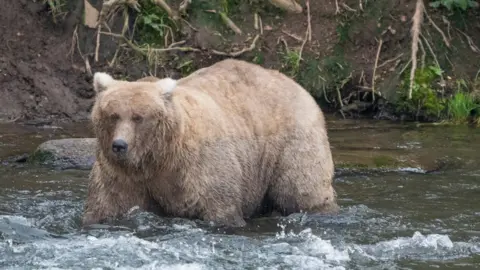Grazer is third female winner of Fat Bear Week
 National Park Service/F. Jimenez
National Park Service/F. JimenezThe wait is over. After a highly anticipated week of competition, voters have crowned a new winner of Fat Bear Week.
They chose 128 Grazer, a defensive mother bear and first-time winner of the sought-after title.
She beat second placed 32 Chunk, a larger bear, by more than 85,000 votes.
"The gutsy girl grounded the guy with a gut," the Alaska Katmai National Park & Preserve, which hosts the event, said in a tweet.
"32 Chunk, proved his prominent posterior was worthy of a whopping win. But in the end, Chunk got Grazered," the park service added.
Fat Bear week, an online event founded in 2014 by former park ranger Mike Fitz, has become an internet sensation, attracting millions of viewers each year.
Each year, fans pick their favourite of 12 plump brown bears from Alaska's Katmai National Park that have gathered along the Brooks River to chomp on salmon and pack on as many pounds before winter.
This year, Grazer received a whopping total of 108,321 votes, according to Explore.org, which tracks the contest for the park service.
A large mother to two litters of cubs with a long muzzle and "conspicuously blonde ears", Grazer is one of the fattest bears to hunt for salmon in the Brooks River, the National Park Service said.
She was introduced to the area as a young cub in 2005, and has since become one of the most successful fishers on the waters.
"She can chase down fleeing salmon in many parts of the river or patiently scavenge dead and dying salmon after they spawn," the National Park Service said.
She has guts, too. The National Park Service said Grazer often preemptively confronts and attacks much larger and more dominant male bears to ensure her cubs' safety.
This year, she beat two favourites for the title: 480 - aka Otis - a 27-year-old brown bear weighing roughly 1,200lb, and 747 - or Colbert - a two-time Fat Bear Week champion weighing about the same.
Her final rival, Chunk - a large adult male with a low-hanging belly - has come out of his shell in recent years, growing from a fairly deferential bear to one of the river's largest and most dominant males.
Still, he proved no match for Grazer, whose "combination of skill and toughness makes her one of Brooks River's most formidable, successful, and adaptable bears", the National Park Service said.
